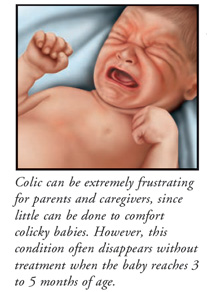 Excessive Crying of Infants
Excessive Crying of Infants
Colic is the condition in infancy when an otherwise healthy baby cries for an extended period at least three days a week for no obvious reason. These crying sessions usually begin three to six weeks after birth and disappear without treatment around 3 to 5 months of age. Colic is frustrating for parents and caregivers because little can be done to comfort colicky babies during these sessions, and the intense, continuous crying is exhausting for the entire family.
The cause of colic is unclear, but there are many theories as to the reason colicky babies cry. It has been suggested that these babies may have difficulty digesting certain milk-based formulas or that the breast milk of mothers who eat certain foods (dairy products or spicy foods) while nursing may irritate the baby’s gastrointestinal tract. Colicky babies may suffer from gastroesophageal reflux (GERD) or excessive intestinal gas. It is unlikely that colic is related to anxious parenting or the infant’s disposition.
Although it is a difficult time for parents, who often feel alarmed and helpless during these intense periods, colic does eventually disappear on its own without any lasting effects. To relieve the inevitable stress caused by a colicky infant’s continuous crying, it is important for parents and caregivers to regularly take a break by seeking help from friends or family.
Typical Problem, No Apparent Cause
Colic is a relatively common problem, with estimates that this pattern of excessive crying occurs in 10% to 25% of normal infants after 3 weeks of age and up until 5 months of age.
Colicky Behavior
The forceful, sustained crying of colic is not the normal crying of a baby who is hungry or tired. Colicky infants are typically not quieted when food is offered, and they often do not fall asleep after tiring themselves out. The crying of colic is uncontrolled and usually begins abruptly and continues for an extended time for no apparent reason. The crying will often occur routinely at about the same time of day, perhaps around dinnertime or late in the evening. Infants with colic often arch their backs and extend their legs or kick violently while clenching their fists. Crying is strong and loud, causing the baby’s face to turn red and sometimes leading to spitting up. Intestinal symptoms, such as passing gas or problems passing stools, are common during a bout of colic. Babies who suffer from colic are otherwise healthy, eat well, and gain weight appropriately. Although they may spit up from time to time, they do not vomit their stomach contents. These babies may pass gas, but they have normal bowel movements. If an infant cries excessively but does not fit the picture described above, colic is not the likely cause of the excess crying.
The diagnosis of colic is made after ruling out other conditions that can cause extended crying in infants. After a complete physical examination and a thorough questioning of the parents about the nature of the crying, the doctor may make the diagnosis of colic when other causes are ruled out.
What You Can Do
There is no one successful treatment for colic. Many times, a change in formula or in the mother’s diet (for breast-feeding babies) can mean an improvement in colic symptoms. Typically, a colicky baby is not hungry and will refuse a bottle or breast, although some babies will accept a water bottle or pacifier. A session of colic can often be shortened by movement, music, or massage. Regular, rhythmic movement, such as rocking in a chair or baby swing or riding in a car seat in a vehicle, can soothe a colicky infant. Some parents have good results by playing background music or nature sounds. Laying the infant on the stomach across the caregiver’s lap and rocking in a chair or gently massaging the baby’s back or belly can also be effective. Since tiny infants can’t be spoiled by the attention, the caregiver should feel free to respond to a colicky baby’s crying by holding and comforting the infant whenever possible.
Your pediatrician or family practice doctor can give you suggestions in how to deal with a colicky baby. Be sure to seek help from a health care professional if your baby isn’t eating well, isn’t gaining weight, or has dry, hard, or bloody stools. Only use antigas (simethicone drops) or antacid medications if advised by your doctor. Avoid the use of natural or herbal teas or other remedies without discussing them with your doctor first, since some of these treatments can be harmful, even in recommended dosages.






